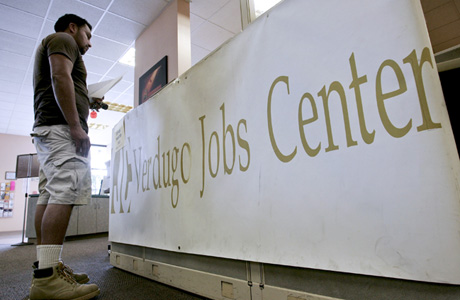US
Capital investment slowdown in US signals reluctance to hire
By Timothy R. Homan (China Daily)
Updated: 2010-08-27 13:49
 |
Large Medium Small |
|
 A job seeker waits to speak to a career counselor at the Verdugo Jobs Center in Glendale, California, on Aug 6. Jonathan Alcorn / Bloomberg
|
WASHINGTON - A slowdown in US business investment may soon hit the job market, further hindering a recovery in the world's largest economy.
Capital spending, one of the few bright spots in the recovery, declined in July, according to Commerce Department figures released on Wednesday in Washington. Sales of new homes fell to the lowest level since data collection began in 1963, another report from the same agency showed, indicating a lack of jobs is crippling housing.

Employers are reluctant to take on more staff until they see more evidence of durable growth, keeping unemployment near a 26-year high and holding back the consumer spending that makes up 70 percent of the economy. A Labor Department report next week may show that private payrolls failed to grow in August for the first time in eight months, said Michael Feroli, chief US economist at JPMorgan Chase & Co in New York.
"If capital spending does weaken further, then that raises some concerns about labor demand and whether firms want to increase hires," said Feroli, who reckons the odds of a recession have increased in the past two weeks to about one-in-three. A decline in private payrolls "would raise some concern about whether the recovery is proceeding or not. If you see a couple of months of decline you'd be more confident that we actually were in a recession".
Applications for unemployment benefits dropped to 490,000 last week from 500,000, the highest level since November, according to the median estimate of 48 economists surveyed by Bloomberg News ahead of a report from the Labor Department in Washington. Projections ranged from 475,000 to 510,000.
The Commerce Department report showed bookings in July for goods made to last at least three years rose 0.3 percent, compared with the 3 percent median gain forecast in a Bloomberg survey. Excluding transportation equipment, demand fell by the most in more than a year.
Orders for non-defense capital goods excluding aircraft, a proxy for future business investment, dropped 8 percent after climbing 3.6 percent in June. Over the past three months, these orders climbed at a 20 percent annual pace, down from a 31 percent gain in the three months to June, signaling companies will rein in investment.
Shipments of those items, used in calculating gross domestic product, decreased 1.5 percent after rising 1 percent in June. A report from the Commerce Department may show the economy expanded at a 1.4 percent rate in the second quarter, down from the 2.4 percent pace previously estimated.
"The manufacturing sector that has played a leading role in the economic recovery to date is beginning to ebb," said John Lonski, chief economist at Moody's Capital Markets Group in New York, who also put the odds of another economic slump at about one-in-three, twice as high as earlier this year. "That warns of a softening in economic growth in the months ahead."
The reports put pressure on the Federal Reserve to take additional steps to sustain the recovery from the worst downturn since the 1930s. Policy makers led by Chairman Ben Bernanke on Aug 10 decided to keep the Fed's holdings of securities stable at $2.05 trillion to prevent money from being drained from the financial system.
Bloomberg News